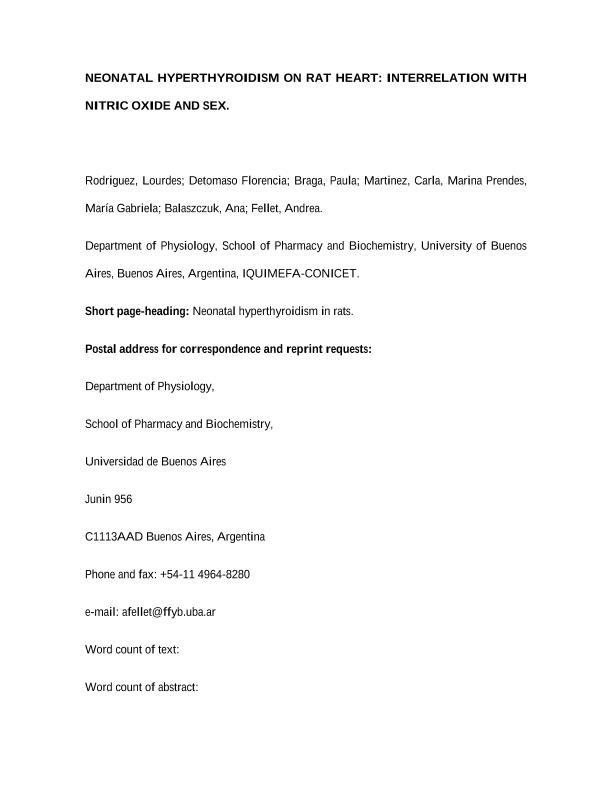Artículo
Neonatal hyperthyroidism on rat heart: Interrelation with nitric oxide and sex
Rodríguez, Lourdes; Detomaso, Florencia M.; Braga, Paula; Marina Prendes, María Gabriela; Perosi, F.; Cernadas, G.; Balaszczuk, Ana María; Fellet, Andrea L.

Fecha de publicación:
06/2015
Editorial:
Editrice Kurtis S R L
Revista:
Journal Endocrinology Investigation
ISSN:
0391-4097
e-ISSN:
1720-8386
Idioma:
Inglés
Tipo de recurso:
Artículo publicado
Clasificación temática:
Resumen
Purpose: To clarify the mechanism mediating the effect of hyperthyroidism on cardiac function during the second month of life in rats. Methods: Male and female Sprague-Dawley rats were assigned to a control or to a triiodothyronine (T3)-treated group. Treatment of each group was started on the third day after birth. Control rats (Eut) received 0.9 NaCl [0.1 ml/100 g body weight (BW)] every second day during 60 days and T3-treated rats (Hyper) received subcutaneous (SC) T3 injections every second day during 60 days. Results: Hyperthyroidism decreased left ventricle volume only in male rats. Female euthyroid rats presented higher atrial nitric oxide synthase (NOS) activity than male rats and hormonal treatment decreased this enzyme's activity in both sexes. Euthyroid male and female rats had similar atrial NOS protein levels, but females had higher caveolin (cav) 3 protein levels. T3 treatment increased this protein only in males. Female rats had lower ventricular NOS activity than male rats; hyperthyroidism increased NOS activity in both sexes but this effect was associated with lower cav 3 protein levels. Hyperthyroidism did not change cav 1 protein levels in both male and female rats. Conclusions: The results of this study demonstrating clinically relevant sex-related differences in the pathophysiology of the hyperthyroid heart have raised new questions regarding the mechanisms responsible for the observed differences. This study suggests that sex-related intrinsic factors such as nitric oxide may modulate the response to hyperthyroidism that leads to cardiovascular dysfunction.
Palabras clave:
Heart
,
Hyperthyroidism
,
Nitric Oxide
,
Sex
Archivos asociados
Licencia
Identificadores
Colecciones
Articulos(IQUIMEFA)
Articulos de INST.QUIMICA Y METABOLISMO DEL FARMACO (I)
Articulos de INST.QUIMICA Y METABOLISMO DEL FARMACO (I)
Citación
Rodríguez, Lourdes; Detomaso, Florencia M.; Braga, Paula; Marina Prendes, María Gabriela; Perosi, F.; et al.; Neonatal hyperthyroidism on rat heart: Interrelation with nitric oxide and sex; Editrice Kurtis S R L; Journal Endocrinology Investigation; 38; 6; 6-2015; 685-694
Compartir
Altmétricas



